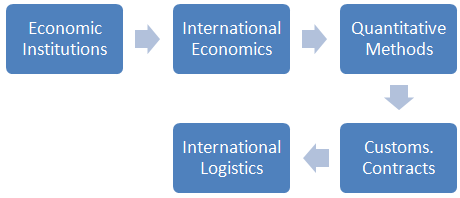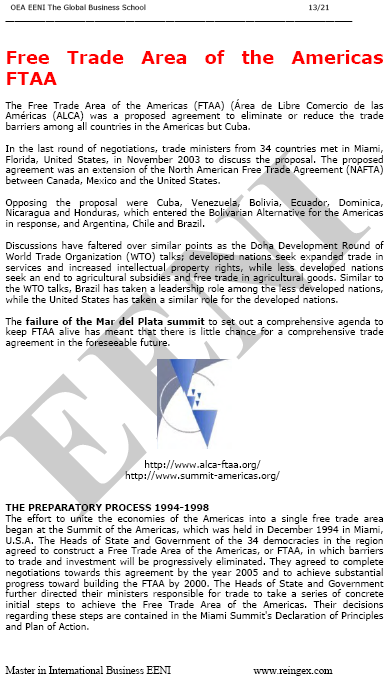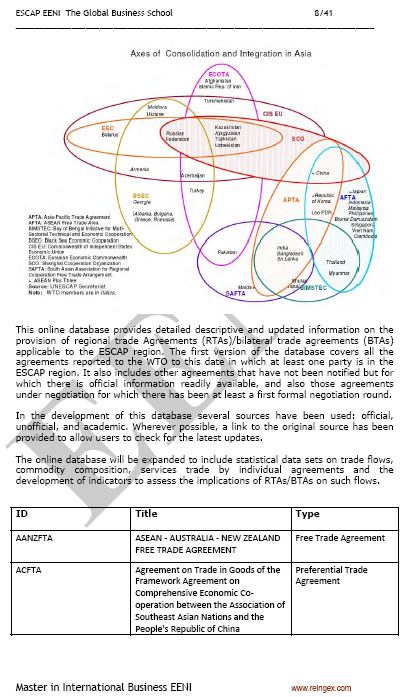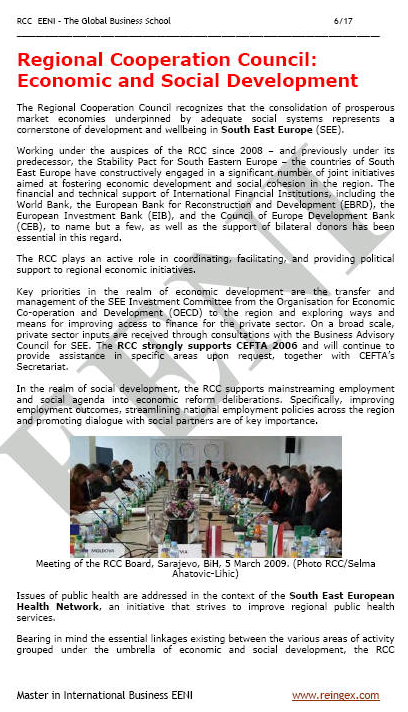Adaptation to the North American and Canadian Students (Bachelor, Trade)
Adaptation of the Bachelor of Science to the North American and Canadian Students (Bachelor of Science in International Trade, e-learning, second semester)
| Bachelor of Science in International Trade |

Subject - “Adaptation of the Bachelor of Science to North American and Canadian Students (Study of the main economic institutions)” - Bachelor of Science in International Trade (second semester).
Proposed topics for North American and Canadian Students:
Syllabus of the Program - Organization of American States (OAS).
- Introduction to the Organization of American States
- Objectives, strategies and principles of the Organization of American States
- Structure and member states of the OAS
- Accompaniment mechanisms of the Organization of American States
- International Trade Information System (SICE)
- Trade Agreements in America
- Summit of the Americas
- Free-Trade Area of the Americas (ALCA)
- Organization of American States and the global crisis
- Inter-American Convention against corruption
Objectives of the Program “Organization of American States (OAS)”:
- To understand the objectives of the Organization of American States
- To know the importance of the Summit of the Americas
- To understand the causes of the failure of the free-trade area of the Americas (ALCA)
- To analyze the trade agreements in America
- To know how to use the International Trade Information System of the Organization of American States
Syllabus of the Program - Inter-American Development Bank.
- Introduction to Inter-American Development Bank
- Operative and organization chart of the Inter-American Development Bank
- Integration of Regional Infrastructure in South America (IIRSA)
- Multilateral Investment Fund (CII)
- Multilateral Investment Fund (FOMIN)
- Projects cycle of the Inter-American Development Bank
Objectives of the Program “Inter-American Development Bank”:
- To understand the objectives, structure and functions of the Inter-American Development Bank (IADB)
- To know the Multilateral Investment Fund, the Initiative of Integration of the Infrastructure Regional in South America and the Multilateral Investment Fund
- To evaluate the funds and financial instruments of the Inter-American Development Bank
- To understand the functioning of the projects and operations of the BID
Syllabus of the Program: Economic and Social Commission for Asia and the Pacific (ESCAP).
- Introduction to the Economic and Social Commission for Asia and the Pacific (UNESCAP) of the UN
- Objectives and programs of the Economic and Social Commission for Asia and the Pacific (ESCAP)
- Economic growth in Asia and the Pacific
- Committee on Foreign Trade and Investment of the UNESCAP
- Foreign trade facilitation in the Asia-Pacific region
- Regional trade agreements in Asia-Pacific
- Statistical yearbook of Asia and the Pacific of the Economic and Social Commission for Asia and the Pacific
Objectives of the Program “Economic and Social Commission of the UN for Asia and the Pacific”:
- To understand the objectives (regional integration, Asian development...) of the Economic and Social Commission for Asia and the Pacific (UNESCAP)
- To analyze the role of the Commission on International Trade and Investment of the UNESCAP
- To know the importance of the Regional trade agreements in Asia-Pacific
- To understand Trade Facilitation programs of the UNESCAP in Asia-Pacific region
Syllabus of the Program - Economic Commission for Latin America and the Caribbean (ECLAC)
- Introduction to the Economic Commission for Latin America and the Caribbean (ECLAC) of the UN
- Objectives of the Economic Commission for Latin America (Iberian America)
- Member countries of the ECLAC
- History of the Economic Commission for Latin America and the Caribbean
- Economic Reports of the Economic Commission for Latin America and the Caribbean (ECLAC)
- Economic development in Latin America (Iberian America)
Objectives of the Program “Economic Commission for Latin America (ECLAC)”:
- To understand the objectives (regional integration, Latin American economic development...) and structure of the ECLAC
- To know the Economic Reports of the Economic Commission for Latin America (Iberian America)
- To analyze the economic development in Latin America (Iberian America)
Syllabus of the Program: Economic Commission for Europe (UNECE).
- Introduction to the Economic Commission for Europe of the UN (UNECE)
- Committee on Foreign Trade of the Economic Commission for Europe
- Economic Cooperation between the countries of the UNECE
- Integration Division of the Commission
Objectives of the Program “Economic Commission for Europe (UNECE)”:
- To understand the objectives, functions and institutions of the Economic Commission for Europe (UNECE)
- To analyze his role in cooperation, Economic Integration, transport.
- To know how to use socio-economic information offered by the UNECE
Syllabus of the Program: Pacific Economic Cooperation Council.
- Introduction to the Pacific Economic Cooperation Council (PECC)
- Working Groups of the Pacific Economic Cooperation Council
- Services Group of the PEEC: foreign trade and investments
- Pacific Food System
- State of the PEEC Region Report
- Index of the economic integration in the region Asia-Pacific
- Pacific Economic Cooperation Council and the free-trade area of the Asia-Pacific
Syllabus of the Program: Regional Cooperation Council (RCC).
- Introduction to the Regional Cooperation Council
- Functions and organization of the Regional Cooperation Council
- Economic and social development
Objectives of the Program “Regional Cooperation Council”:
- To understand the functions and objectives of the Regional Cooperation Council
- To evaluate the areas and cooperation process in South-East Europe
Syllabus of the Program: South Asian Association for Regional Cooperation (SAARC).
- Introduction to the SAARC
- Areas of cooperation of the SAARC
- South Asian Preferential Trade Agreement (SAPTA)
- South Asian free-trade area
- South Asian Economic Union
- Foreign Trade of the South Asian region
Objectives of the Program “South Asian Association for Regional Cooperation (SAAR)”:
- To understand the objectives and functions of the South Asian Association for Regional Cooperation
- To evaluate the benefits for the member countries of the SAARC as well as their areas of cooperation
- To analyze the South Asian free-trade area (SAFTA) and the South Asian Economic Union
- To analyze the foreign trade between the member countries of the South Asian Association for Regional Cooperation
Note: The U.S. is an observer member of the SAARC.
Syllabus of the Program: Organization of the Black Sea Economic Cooperation (BSEC).
- Introduction to the Organization of the Black Sea Economic Cooperation
- Areas of cooperation of the BSEC
- Black Sea Trade and Development Bank
Objectives of the Program “Organization of the Black Sea Economic Cooperation (BSEC)”:
- To understand the objectives and functions of the Organization of the Black Sea Economic Cooperation (BSEC)
- To analyze the areas of cooperation of BSEC
- To evaluate the role of the Black Sea Trade and Development Bank
Note: the U.S. is an observer member of the BSEC.
Syllabus of the Program: Council of the Baltic Sea States:
- Introduction to the Council of the Baltic Sea States (CBSS)
- Vilnius Declaration
- Regional economic development
- Report on the state of the Baltic region
Note: the U.S. is an observer member of the CBSS.
Syllabus of the Program: Association of Caribbean States (ACS)
- Introduction to the Association of Caribbean States
- Organization and Functions and of the Association of Caribbean States
- Member countries of the ACS
- Trends in Caribbean Foreign Trade
- The Caribbean Expanded Economic AREA
- Trade Agreements in the Caribbean
The objectives of the subject “Association of Caribbean States (ACS)” are the following:
- To understand the aims and functions of the ACS
- To evaluate the benefits for the member countries of the Association of Caribbean States
- To analyze the economic and trade integration process between the member countries of the ACS
- To analyze the economic relations between the countries of the Association of Caribbean States with the country of the student
- To understand the concept of the Caribbean Expanded Economic Area
Note: Canada is an observer member of the Association of Caribbean States.
Subjects of the second semester of the Bachelor of Science in International Trade.

ECTS: European Transfer and Accumulation System
Samples: adaptation of the Bachelor of Science to the North American and Canadian Students (Study of the main economic institutions) (Bachelor of Science in International Trade, e-learning, second semester).



Language of the subject “adaptation of the Bachelor of Science to the North American and Canadian Students (Study of the main economic institutions)” of the Bachelor of Science in International Trade (second semester):  or or
or or  EENI
EENI  EENI
EENI  EENI.
EENI.
(c) EENI Global Business School (1995-2024)
We do not use cookies
Top of this page

